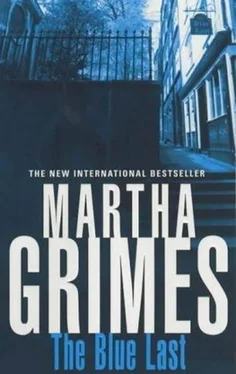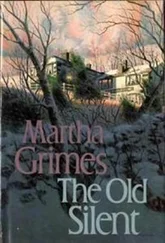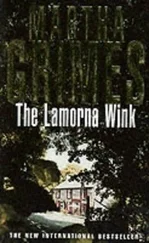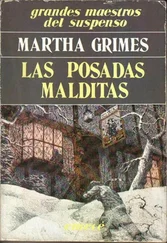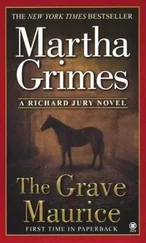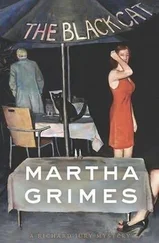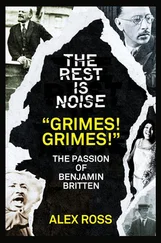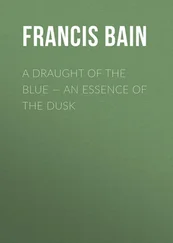Martha Grimes - The Blue Last
Здесь есть возможность читать онлайн «Martha Grimes - The Blue Last» весь текст электронной книги совершенно бесплатно (целиком полную версию без сокращений). В некоторых случаях можно слушать аудио, скачать через торрент в формате fb2 и присутствует краткое содержание. Жанр: Детектив, на английском языке. Описание произведения, (предисловие) а так же отзывы посетителей доступны на портале библиотеки ЛибКат.
- Название:The Blue Last
- Автор:
- Жанр:
- Год:неизвестен
- ISBN:нет данных
- Рейтинг книги:3 / 5. Голосов: 1
-
Избранное:Добавить в избранное
- Отзывы:
-
Ваша оценка:
- 60
- 1
- 2
- 3
- 4
- 5
The Blue Last: краткое содержание, описание и аннотация
Предлагаем к чтению аннотацию, описание, краткое содержание или предисловие (зависит от того, что написал сам автор книги «The Blue Last»). Если вы не нашли необходимую информацию о книге — напишите в комментариях, мы постараемся отыскать её.
The Blue Last — читать онлайн бесплатно полную книгу (весь текст) целиком
Ниже представлен текст книги, разбитый по страницам. Система сохранения места последней прочитанной страницы, позволяет с удобством читать онлайн бесплатно книгу «The Blue Last», без необходимости каждый раз заново искать на чём Вы остановились. Поставьте закладку, и сможете в любой момент перейти на страницу, на которой закончили чтение.
Интервал:
Закладка:
Jury had left the train at Holborn underground and walked along High Holborn, stopping to regard Lincoln’s Inn Fields. He called to mind the poet Chidiock Tichbourne, who was trapped in the net of a conspiracy to murder Queen Elizabeth. Though utterly innocent of anything, he was executed. Jury had always thought that poem he composed had one of the saddest refrains he’d ever come across. “And now I live and now my life is done.” Chidiock Tichbourne had been seventeen when he wrote that, seventeen when he was executed. Seventeen.
He had brought Mickey’s snapshots with him. He did not know why. Occasionally, he would take out one or the other, stare at it for a few moments and wonder if Mickey was right. And wonder also why the solving of this puzzle meant so much to him. “There’s not enough time.” There never is, thought Jury. Of course he knew why he’d brought the pictures along; the mystery was locked inside them.
He walked along Holborn Viaduct into Newgate Street, past St. Paul’s and into Cheapside, which he had always liked and which he would have liked to traverse back in the seventeenth century when it was a huge, bustling market. He loved it for its Londonness. He liked the way that each guild had its own area: bakers in Bread Street, fishmongers in Friday Street, dairymen in Milk Street, which is where he had stopped now. He thought he might fancy a drink in the pub before him called the Hole in the Wall. On this bit of land had once been one of those prisons called counters, where the poor wretches could acquire “accommodation” according to their ability to pay. Since some weren’t poor, they got the best. But the poorest were stuck in the darkest dungeon, where the fetid air could turn to fresh only by the admission of fresh air entering through a hole in the wall. It was here also that the prisoners begged food of passersby. If there had ever been a more corrupt system than the prison system, Jury was hard put to think of one. He decided he didn’t fancy a drink after all but to go into Bread Street.
He stopped again near the corner of Cheapside. Here, if his modicum of geography served him right, was almost hallowed ground for here had stood the Mermaid Tavern until the Great Fire of 1666. He stood looking at the building here now and envisioning what had gone before, until the one peeled away and the Mermaid emerged (not, perhaps true to itself, but wasn’t the shell of one public house pretty much like another?). In his mind’s eye he entered to find it smokier, rowdier and filled with more raucous laughter and louder screams for beer than could be witnessed at his pub in Islington, the Angel. There were no women, nary a one, except for the barmaid, her breasts spilling out of her loosely laced shift.
And since his imaginings landed him in the first part of the seventeenth century-there they sat, ranged around a table, men more sagacious, less bemused than any others he could name: Ben Jonson, Shakespeare, Donne, Beaumont and Fletcher, John Webster, Walter Raleigh (who had founded this “club”) and in a shadowy corner Dr. Johnson, the only one standing in case he wanted to make a quick exit and the only one as yet unborn.
Jury thought it remarkable that all of these icons of literature could be gathered in the same room, sitting around the same table. He wanted to know what they thought. So he told them the story in the photos. None of them but only half attended to him for they laughed and quipped all the while (Webster asking, “Is this, then, what the Peelers have come to? If you lit all the lamps in London could this man find his feet?” )
“You know what it sounds like?” said Webster.
“ I do indeed, Mr. Webster,” said Beaumont. “Sounds like someone’s stolen my plot of The Changeling.”
“Don’t be ridiculous,” said Shakespeare. “It’s a tale told by an idiot, et cetera, et cetera.” He banged his tankard on the table and yelled for ale through the smoke and coal-dusted air.
Ben Jonson called for “a cup o’ Canary wine, now, Megs!”
The buxom barmaid waved her hand. “My point is,” said Jury, “should I believe it?”
All seven of them sat transfixed by the idiocy of this question. Then they found it wonderfully risible.
Megs had come, laces dancing, and answered him: “If it’s belief as concerns you, sir, you just step across the street to St. Mary-le-Bow.”
“Ah, but they might come along and burn him for high treason,” yelled Fletcher.
Jury stuck to his guns, for here was more sagacity than he would meet in his lifetime: “Is it true?”
Unborn or not, Samuel Johnson couldn’t keep still. “The man’s dying, you fool; why would he waste his time talking about this impersonation if it hadn’t occurred or something else occurred enough like it to ribbon the tale round with such finery as would secure your aid. He needs your help, man, though I must say, help from you is about as necessary as t’was Chesterton’s.”
Jury did not know what he meant; Dr. Johnson did not enlighten him, but faded back into the shadows again.
Jury thought: yet there’s something in the advice he should pay attention to but, in the way of elusive clues, he could not see what.
“You’re all intuitionists.”
They regarded one another with a raised eyebrow, a questioning glance, a finger pointed in Jury’s direction.
Refusing to give up, Jury said, “Intuit. Go on.”
Donne, who had joined less in the raillery around the table, cleared his throat and said, “You undertake to help this man because you feel his story is yours.”
“Yes. No. I wasn’t posing as someone else. Not that part of the story.”
Donne waved this away, saying, “That’s merely the pièce de résistance to engage your interest; it’s merely a corner turned in the real mystery and is insignificant.”
“But it’s the whole mystery. It’s the one question to be answered.”
“It is crucial only if you’re not looking around.”
“Looking around? Looking around for what ? Pardon me, but you’re talking in riddles.”
“Riddles!” said Beaumont. “It’s you who’re hearing them; he’s not talking them.”
“You’re too insistent, Mr. Jury,” said Webster, “on your own notion of mystery. Probably because you’re one of these detective types such as our so-called writers in Grubb Street write about, composers of temporary poems and bad detective novels,” said Fletcher.
“The thing is, Mr. Jury, you already know that part of it. What you’d call the solution, the answer, the conclusion, call it what you will. But that’s the chaff; that’s what’s left behind in the dust. A kills B. You strive to discover A’s identity. You do and bring him in.”
“It’s not that simple-”
“Of course it is,” said Webster. “A hundred hacks in Grubb Street right this moment are writing their detective tales-”
“Century! Century!” bellowed Dr. Johnson. “There are no detective stories until E. A. Poe!”
“You’re past it, mate,” said Fletcher to Jury.
“Can’t see the woods for the trees,” said Beaumont, adding, “who said that, anyway?”
Fuck you two, Jury thought. Couple of pricks. “Thank you, Mr. Donne and Dr. Johnson. I know you’re trying to help. Unlike some others I could name.” He cast a baleful look at Beaumont and Fletcher, then asked, “Just what did you guys write?” Jury was pleased to see the pink flush across their faces.
“T’is Pity She’s a Whore,” called out Ben Jonson. “Megs, Megs! We’re talking about you! More wine! An excellent play! Ran six months in the Duchess.”
Читать дальшеИнтервал:
Закладка:
Похожие книги на «The Blue Last»
Представляем Вашему вниманию похожие книги на «The Blue Last» списком для выбора. Мы отобрали схожую по названию и смыслу литературу в надежде предоставить читателям больше вариантов отыскать новые, интересные, ещё непрочитанные произведения.
Обсуждение, отзывы о книге «The Blue Last» и просто собственные мнения читателей. Оставьте ваши комментарии, напишите, что Вы думаете о произведении, его смысле или главных героях. Укажите что конкретно понравилось, а что нет, и почему Вы так считаете.
